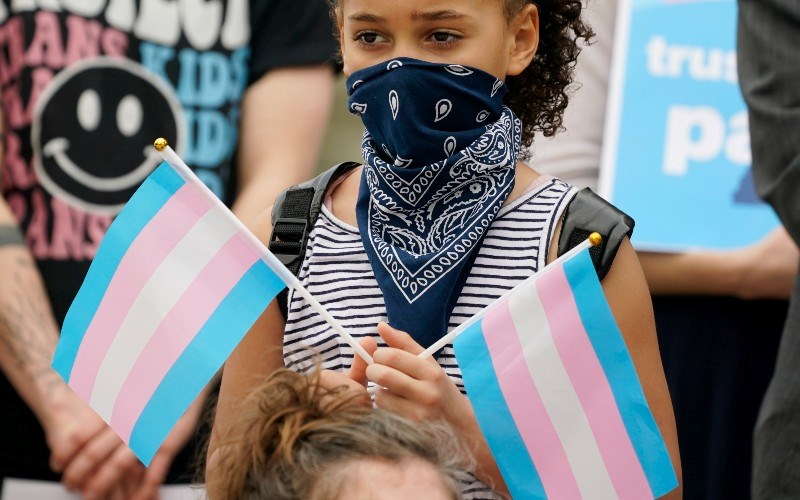https://washingtonstand.com/commentary/a-double-standard-in-campus-violencehttps://washingtonstand.com/commentary/a-double-standard-in-campus-violencehttps://washingtonstand.com/commentary/a-double-standard-in-campus-violenceImagine the following: a pro-transgender student group set up an approved display table in their college dining hall with a reservation lasting until 4 p.m. (which won’t overlap with the evening rush). The display featured posters with stories about individuals who have socially and medically transitioned, a Progress flag, and flyers claiming to show medical evidence why people with gender dysphoria need gender transition procedures to avoid suicide.
Imagine further that an “anti-LGBT” crowd gathered to protest, holding cardboard signs that contradicted the display’s claims. After a peaceful beginning, some members of the crowd ripped up the posters, threw the flyers away, and yelled at the students manning the display. After the police arrived, one member of the crowd charged the table, flipping it over and hitting two students behind it. That member of the crowd was arrested for his aggressive behavior.
This story actually happened Thursday — except that the roles were reversed.
The table display, sponsored by the Michigan State University chapter of Young Americans for Freedom (YAF), featured stories of detransitioners and the ongoing suffering caused by the gender transition procedures performed on them. It offered flyers with facts about the dangers of gender transition procedures and rising regret experienced by young people who undergo such procedures.
The crowd’s signs, by contrast, insisted lamely that “trans rights are human rights.” A protestor called those manning the display “bigots” and claimed (irrelevantly) that one of the protestors was a “two-spirited” Native American. Someone evidently reported a disturbance because the police arrived; however, the display had been duly approved, so the police did nothing to remove it. After taking statements from both sides, the police made people leave when one protester ran past the cop and flipped the table into two students behind it, right in front of the cops.
The police arrested that student for assault and for violating a campus ordinance that stated, “No person shall obstruct, hinder, or impede the normal use or operation of any campus building or area which has been assigned or scheduled for educational or extracurricular activities.” If the police had not been present on the scene, it’s possible no one would have been arrested.
The most shocking aspect of this story is not the actual incident itself — members of a progressive mob resorted to petty violence against a minority of conservative students with better arguments — but its reception in the media.
Consider again the hypothetical incident described in the first two paragraphs. Setting aside, for a moment, the absurdity of an “anti-LGBT” crowd gathering in a college dining hall — where would they even find the numbers, let alone the courage? — imagine what media furor would result from such an encounter. Everyone, from NBC to CNN to Fox News, probably, would have covered the incident by the next morning. Legacy media from The New York Times to USA Today would run stories on the dangers trans-identifying students experience on college campuses. LGBT outlets would publish hit pieces on the perpetrator and all his associates.
The incident would spin into multiple news cycles when the outside pressure campaign began. Activist groups like Human Rights Campaign would demand the student’s suspension. President Biden would name the “victims” in a speech announcing more pro-transgender policies. Progressive members of Congress would begin hawking some new hate crime bill they have introduced for years without getting any traction. If they could, the media would have turned the story into a November voting issue.
Now consider the media’s reception of events as they actually happened. The MSU student paper ran an article on Thursday because students getting arrested for assault is news on campus. A reporter for the conservative National Review picked up the story in a piece published Friday afternoon. Otherwise, web searches using multiple engines did not yield a single additional story published before this article.
Why the difference in treatment? Obviously, there is political tribalism going on. But it’s worth spelling out more precisely the exact nature of this journalistic double standard.

I contend that progressive media outlets are political allies of transgender ideology because they share the compatible, culture-wide worldview of expressive individualism. With slogans like “be true to yourself” or “follow your heart,” this worldview argues that individuals should have the right “to define and express their identity,” as Supreme Court Justice Anthony Kennedy famously said in Obergefell v. Hodges (2015). The common denominator to these various articulations of expressive individualism is that a person should define himself or herself by looking inward. This premise makes a person’s inner feelings the ultimate arbiter of that person’s truth.
Once you already believe that your identity is determined by your inner feelings, it’s hard to find a rational basis to object when someone else claims that he feels like a woman or she feels like a man, whatever that person’s biology might say. Thus, progressive reporters, having accepted the premises of expressive individualism, must also swallow the logical extension of that worldview to transgenderism.
However, the application is inconsistent, as this campus double standard shows. Personal stories by detransitioners are a powerful rebuke to the excesses of transgender ideology because they refute its claims in terms comprehensible to expressive individualism. By definition, a detransitioner is someone who once felt like people who identify as transgender, but does so no longer.
For example, detransitioner Chloe Cole was born a biological female, felt for several years during adolescence that she should be a boy, but now no longer feels that way. She knows that she is a woman, and she now feels regret for the ongoing, physical repercussions of the gender transition procedures unethically foisted upon her when she was too young to legitimately consent.
Such testimony by detransitioners may make pro-transgender progressive ideologues uncomfortable. But if they’re being intellectually honest, they must admit that the testimonies of detransitioners are just the same type of felt experience they claim to credit among people who identify as transgender.
If a right-wing crowd roughed up a pro-transgender display, media voices would label the perpetrators as “hateful” for denying the felt experience of those experiencing gender dysphoria. So, when a pro-transgender crowd roughs up a display featuring the stories of people who used to identify as transgender, but no longer do so, it’s worth asking whether their actions — same in kind, but opposite in politics — are hateful or newsworthy.
Of course, there are many problems with expressive individualism, especially for those committed to believing that God, not our feelings, is the absolute source of truth. And there are many reasons to be skeptical of “hate” accusations, especially when elevated to the level of a crime. These problems and reasons go beyond the scope of this article. The point here is simply that the Left’s hostility toward detransitioners is philosophically inconsistent with the favor and credulousness they show toward those who identify as transgender. If the media, or MSU students for that matter, were intellectually honest, they would listen to those who have detransitioned just as closely as they listen to those who are trying to transition.
Editor's Note: This story first appeared here.
Notice: This column is printed with permission. Opinion pieces published by AFN.net are the sole responsibility of the article's author(s), or of the person(s) or organization(s) quoted therein, and do not necessarily represent those of the staff or management of, or advertisers who support the American Family News Network, AFN.net, our parent organization or its other affiliates.








